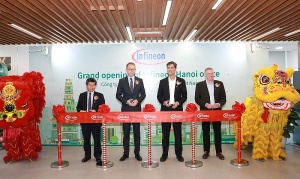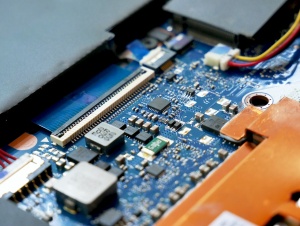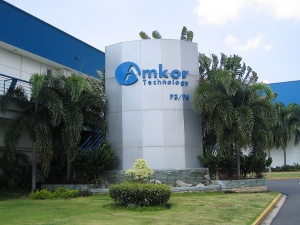Semiconductor makers set up shop
| Semiconductors are required for everything from cars to fridges |
Amkor Technology’s $1.6 billion semiconductor plant in the northern province of Bac Ninh, Amkor’s largest facility worldwide, is scheduled for trial production by late October 2023.
Secretary of Bac Ninh Party Committee Nguyen Anh Tuan conducted an inspection of the construction progress at Amkor Technology Vietnam’s plant last week. Tuan expressed his joy at the on-schedule construction of the Amkor plant, while ensuring labour safety. “This facility will not only be Amkor’s largest and most advanced plant globally, but also a model working environment for the group. Amkor plant in Bac Ninh is a key project, marking the beginning of a new trend in attracting new investment to the province,” Tuan said.
South Korean chip equipment giant Hanmi Semiconductor last week announced the introduction of its local arm, Hanmi Vietnam set in Bac Ninh province, in a bid to revolutionise the semiconductor landscape.
Hanmi Semiconductor’s CEO Kwak Dong-shin believes that Vietnam’s rising status as a global production hub for semiconductor giants makes expanding into the country a strategic move.
Following suit, Infineon Technologies AG, Germany’s largest semiconductor manufacturer, earlier this month disclosed its plans to expand operations in Vietnam. The development coincided with the official inauguration of Infineon’s new office in Hanoi, with a primary focus on chip technology research and development, as well as sales and marketing.
By the end of 2023, Infineon aims to assemble a team of approximately 25 technical experts in the chip development division.
“Hanoi seeks to solidify its position as an internationally renowned hub for research and development, comparable to Infineon’s prominent centres in Germany, Austria, India, and Singapore,” noted C.S. Chua, chairman and CEO of Infineon Technologies Asia-Pacific.
The semiconductor market value in Vietnam is set to grow by $1.65 billion over 2020-2025, according to research firm Technavio.
The growing adoption of the Internet of Things and smart home technologies are driving the growth of the semiconductor market in Vietnam, and semiconductor component manufacturing sites are being expedited to alleviate global shortages. Foreign companies, including Samsung, Hana Micron Vina, and Amkor Technology, among others, have invested in these projects.
Liu Xin, marketing director of Vietnam Ibe Laser Technology Co., Ltd. expressed optimism, “Vietnam presents greater opportunities as the electronics landscape evolves, transitioning away from China’s dominance. I think the number of printed circuit board assembly and semiconductor manufacturers will double or triple in the country soon.”
Ibe Vietnam may consider doubling the size of its factory in the next five years, Xin added. “At present, despite our new entry, I believe that Vietnam is a great country for investment thanks to support from the local authorities,” she told VIR. In late April, Ibe Vietnam commenced operations at its $15 million factory after three years of construction.
A report by the Bank of Korea (BOK) in May highlighted Vietnam’s rapid emergence as a significant market for South Korean semiconductor makers, who have been grappling with reduced demand in China due to the escalating US-China conflict.
“Major smartphone manufacturers have established production bases in Vietnam, with South Korean semiconductors playing a crucial role as intermediary goods in the production of finished products. Vietnam’s abundant low-wage workforce and its proximity to the Chinese market have attracted global businesses, including South Korean firms, to establish manufacturing facilities in the Southeast Asian nation,” outlined the BOK.
Dr. Nguyen Khac Giang, a scholar from the ISEAS - Yusof Ishak Institute, said that by strategically embracing semiconductor sector development, Vietnam has the potential to elevate its global standing within the value chain, transitioning from a labour-intensive paradigm to a technologically advanced economic framework.
“This transformative shift would enable Vietnam to realise its ambition of achieving a per capita GDP surpassing $18,000 by 2045,” he said.
However, Giang underscored the imperative for recalibrating the policy framework, fostering increased vocational training programmes in high-tech domains, and bolstering support mechanisms for domestic firms.
With a primary focus on attracting prominent industry leaders, Vietnam has successfully enticed investments from notable entities such as Intel, which stands as the pioneer multinational corporation to manufacture semiconductor chips within Vietnam’s borders, with its manufacturing facility strategically situated in Ho Chi Minh City.
 | Infineon Technologies expands operations in Vietnam Infineon Technologies AG, the prominent German global semiconductor solutions provider, has recently unveiled plans to expand its operations in Vietnam. As part of this strategic move, the company is establishing a dedicated electronic chip development team based in Hanoi. |
 | Hanmi Semiconductor spreads wings in Vietnam South Korean firm Hanmi Semiconductor has forged its path into Vietnam, capitalising on the country’s strategic foothold in Asia's high-tech supply chain and its bountiful pool of local talent. |
 | Infineon expands operations in line with Hanoi’s R&D goals German global semiconductor solutions provider Infineon Technologies AG has unveiled plans to expand its operations in Vietnam. |
 | Amkor's $1.6 billion plant in Bac Ninh on track for October Amkor Technology's $1.6 billion semiconductor plant in the northern province of Bac Ninh, Amkor's largest facility worldwide, is scheduled for trial production by late October 2023. |
What the stars mean:
★ Poor ★ ★ Promising ★★★ Good ★★★★ Very good ★★★★★ Exceptional
Related Contents
Latest News
More News
- SK Innovation-led consortium wins $2.3 billion LNG project in Nghe An (February 25, 2026 | 07:56)
- THACO opens $70 million manufacturing complex in Danang (February 25, 2026 | 07:54)
- Phu Quoc International Airport expansion approved to meet rising demand (February 24, 2026 | 10:00)
- Bac Giang International Logistics Centre faces land clearance barrier (February 24, 2026 | 08:00)
- Bright prospects abound in European investment (February 19, 2026 | 20:27)
- Internal strengths attest to commitment to progress (February 19, 2026 | 20:13)
- Vietnam, New Zealand seek level-up in ties (February 19, 2026 | 18:06)
- Untapped potential in relations with Indonesia (February 19, 2026 | 17:56)
- German strengths match Vietnamese aspirations (February 19, 2026 | 17:40)
- Kim Long Motor and AOJ Suzhou enter strategic partnership (February 16, 2026 | 13:27)

 Tag:
Tag:




















 Mobile Version
Mobile Version